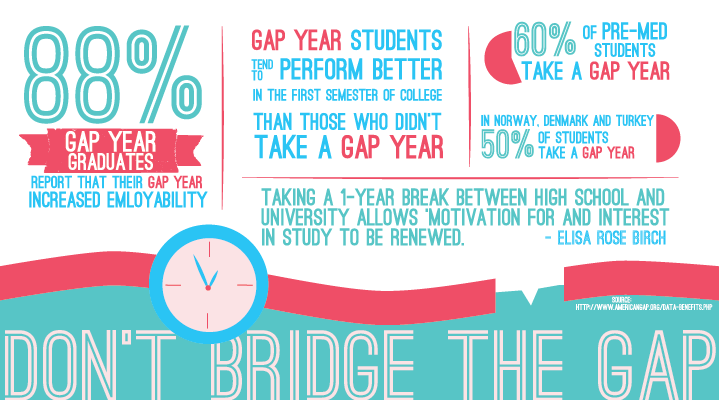U.S. schools would benefit greatly from having a gap year
December 1, 2015
Have you ever wanted to just take a break from school? How about traveling? Did you know that there is actually a thing for this, and it’s been around for quite a while. It’s called a gap year.
Before I begin, allow me to provide a brief definition on what a gap year is. The gap year is a term for a common practice of students in many European countries that sits between the final year of high school and the beginning year of college. Students use this period in their education to focus on gaining world experience and further developing any skills that make them unique, rather than going from high school and straight into college or the working world.
There are different groups and programs for gap years in the United States such as the American Gap Association, where “Integrity in Gap Years” is their main focus, however the stimulus for a US gap year and perhaps a gap year United Kingdom is somewhat different, and here’s why.
In comparison to the rest of the world, the US standards for education are reaching new levels of extreme in terms of stress, workload, and above all expectations. Students are expected to have a minimum of a bachelor’s degree in a prestigious college, otherwise you may receive negative reactions when you plan to do otherwise and what’s worse – people believe that it’s socially acceptable. I can’t tell you how many times I’ve heard stories of the negative reactions of parents and relatives when their children take an alternative path to education. The US hasn’t really ever taken the time to give students a time to slow down and take a break from all of the hyperactive mental stimulus that is constantly thrown at us, and to many, if something doesn’t always correlate to your career, then it’s not exactly in the cards for you.
However many countries such as Finland, Sweden, Norway, and England are leading the education reform movement by understanding that rather than pressure your students to do better, you should direct your students to be individuals. Such reforms include (you guessed it) a gap year, and not just that, but a gap year that is socially acceptable and often times recommended in many social groups.
Jennifer Moy is an author for the online website for the Go Overseas Program which is an agency that has different advice on travelling. She writes that “Recent statistics from UCAS show that over 5% of accepted university applicants in the UK deferred admission for one year in 2012. Statistics in the USA pale in comparison, where an estimated 1.2% of first-time college freshmen deferred admission in 2011 to take a gap year, according to the Higher Education Research Institute.”
Perhaps one reason, if not the main one, that gap years in the US have failed to take such a hold on the general student body, is because ever since our youth, we’ve been told that the only way to live successfully is to go to school, then go to college, and either transition to a career or pursue a higher degree, and finally work until retirement – or for some – until death. The US hasn’t really ever taken the time to give students a time to slow down and take a break from all of the hyperactive mental stimulus that is constantly thrown at us, and to many, if something doesn’t always correlate to your career, then it’s not exactly in the cards for you.
“…the important thing is that their popularity is growing.” Says Moy. “Recent studies are partially responsible for this: nine out of ten students who take a gap year do return to attend college, and are actually more focused and motivated than their counterparts (those who enrolled directly from high school).”
Finally, some misconceptions about gap years are as follows: 1) That schools/colleges already offer them, 2) that the only people who take a gap year have rich parents, and 3) gap years are useless on resumes. So let’s go through these together.
1. “But my college has a gap year program. Why bother taking another year off when I can just take the program there?”
This is true, and while taking an educational facilitated gap year works for some, it may not work for others. The point of a gap year is to not only take time off from academic burn-out, but to also travel on your own and discover and educate yourself to your own unique standards. Plus, if you do take a facilitated gap year, you would most likely have to pay more on top of your already expensive tuition fee, and what may work for some students in the program may not work for you. A gap year is your year to individually tailor your experiences to what feels right to you and you alone.
2. Gap years are expensive and only kids with rich parents can splurge on those anyway.
Allow me to reiterate: A gap year is your year to individually tailor your experiences to what feels right to you and you alone. This doesn’t mean you have to break the bank in order to do this, but if you think it’ll be necessary, then there are plenty of opportunities to plan your gap year.
3. “A gap year makes you seem lazy, so why would I put it on my resume?”
There are quite a few ways as to how you can make this work for you, and to be honest, this question has both a true and a false statement to it. If you spend an entire year not fulfilling your goals, then yes, this statement is very true and you should probably avoid going into detail about it, or just not include it at all. However, if you travelled, interned, formed a new hobby or skill, or did something else that enhanced you as an individual, then go ahead – put it on that resume! Employers are often seeking to hire individuals who will add to their business.
In conclusion, there are many ways a gap year has been shown to be beneficial to many individuals, yet the most important thing is that your gap year isn’t anyone else’s and that you use it to help you grow organically into the person you want to be proud of showing.










